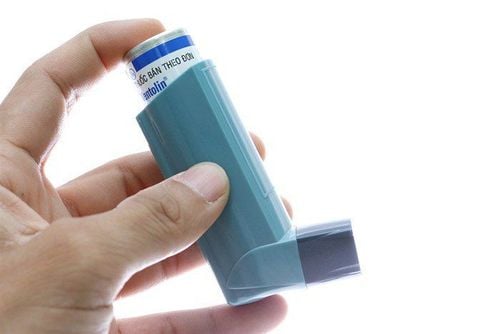This is an automatically translated article.
Asthma is a disease that cannot be cured completely, but asthma medications can control symptoms well. To avoid potentially dangerous complications, patients need to be periodically re-examined to closely monitor the progression of the disease.1. How to treat asthma effectively?
Asthma is a disease that cannot be completely treated, whereby the disease also leaves many inconveniences and affects the quality of the patient's health.
Accordingly, long-term relapse prevention and symptom control are critical factors in stopping asthma attacks before the disease even begins. Accordingly, treatment methods often include recognizing the triggers, taking preventive steps, and monitoring the breath to ensure that the asthma medication that the person takes every day is controlling the symptoms. . In the event of an asthma attack, the person may need to use a quick-acting inhaler, such as albuterol.
2. What are drugs to treat asthma?
Whether asthma medications provide good control of your symptoms depends on a number of factors, such as your age, symptoms, asthma triggers, and which medications work best for asthma control.Preventive medicine that controls long-term asthma reduces the inflammation of the airways that cause symptoms. Rapid-acting metered-dose inhalers (bronchodilators) work quickly to widen swollen airways that make breathing difficult. In some cases, anti-allergy medication is also needed.

Tình trạng bệnh hen phế quản gay khó thở ở người bệnh
2.1 Long-term asthma control medications These are foundational asthma medications, usually taken every day. These medications control asthma daily and reduce the risk of an asthma attack, including:
Inhaled corticosteroids . These anti-inflammatory drugs include fluticasone (Flonase, Flovent HFA), budesonide (Pulmicort Flexhaler, Rhinocort), flunisolide (Aerospan HFA), ciclesonide (Alvesco, Omnaris, Zetonna), beclometasas furoate (Arnuity Ellipta). Patients often need to take these medications for days to weeks before they are most effective. Unlike corticosteroids, these drugs have relatively low side effects and are generally safe for long-term use. Leukotriene inhibitors. These oral medications — which include montelukast (Singulair), zafirlukast (Accolate), and zileuton (Zyflo) — help relieve asthma symptoms for up to 24 hours. In rare cases, these drugs have been associated with psychological reactions, such as agitation, temper tantrums, hallucinations, depression, and suicidal thoughts. Patients should consult a doctor immediately if they have any unusual reactions.
Long-acting beta-agonists. These inhalers, including salmeterol (Serevent) and formoterol (Foradil, Perforomist), help open the airways. Some research shows that they may increase the risk of a severe asthma attack, so only take them in combination with an inhaled corticosteroid. And because these medicines can mask asthma deterioration, this medicine should not be used for an acute asthma attack.

Thuốc corticosteroid dạng hít
Combination inhaler. These medicines - such as fluticasone-salmeterol (Advair Diskus), budesonide-formoterol (Symbicort), and formoterol-mometasone (Dulera) - contain a long-acting beta agonist along with a corticosteroid. Because these combination inhalers contain long-acting beta agonists, they may increase a person's risk of having a severe asthma attack. Theophylline. Theophylline (Theo-24, Elixophyllin, and others) is a daily medication that helps open the airways (bronchodilators) by relaxing the muscles around the airways. This drug is not used as often as it has been over the years. 2.2 Quick-relief medicines These are medicines that are used when needed for short-term quick relief of symptoms during an asthma attack – or before exercise as recommended by your doctor. Rapid-acting drugs include:
Short-acting beta-agonists. Inhaled bronchodilators work within minutes to quickly relieve symptoms during an asthma attack. These include albuterol (ProAir HFA, Ventolin HFA, others) and levalbuterol (Xopenex). Short-acting beta-agonists are given by using a hand-held inhaler or nebulizer - which converts asthma medication into a fine mist - that the person inhales through a mask or mouthpiece.
Ipratropium (Atrovent). Like other bronchodilators, Ipratropium works quickly to immediately dilate the airways, making it easier for people to breathe. Ipratropium is mainly prescribed for emphysema and chronic bronchitis, but it is sometimes used to treat asthma attacks. Oral and intravenous corticosteroids. These drugs - including prednisone and methylprednisolone - reduce airway inflammation caused by severe asthma. They can cause serious side effects with long-term use, so these medicines are only used on a short-term basis to treat severe asthma symptoms.

Thuốc Corticosteroid đường uống
Patients are advised to record the number of uses per week. If you need to use your quick-acting inhaler more often than your doctor recommends, see your doctor. Patients may need to adjust their long-term asthma control medication.
2.3 Anti-allergic drugs Anti-allergy medications are used in cases of asthma triggered or worsened by allergies, including:
Allergen injections (Immunotherapy). Antigen injections gradually decrease the immune system's response to specific allergens over time. Patients are usually injected once a week for several months, then once a month for about 3-5 years. Omalizumab (Xolair). Patients with severe allergies and asthma receive this injection every 2 to 4 weeks. This drug works by altering the immune system. 2.4 Thermal bronchiectasis This treatment is not widely used, but only for severe asthma where treatment with inhaled corticosteroids or long-acting asthma medications has not been effective.
Usually thermal bronchial orthotics heat the airways from the inside with electrodes, reducing the smooth muscles inside the airways. This method reduces the risk of airway constriction, helps people breathe easier, and can reduce asthma attacks.

Phương pháp chỉnh hình phế quản bằng nhiệt
3. Treat according to disease severity for better asthma control
The treatment plan should be flexible and based on the variability of symptoms, as assessed through each visit with the physician, so that the physician can tailor the treatment accordingly.For example, if a patient's asthma is well controlled, the doctor may reduce the amount and dose of medication. If your asthma is not controlled or tends to get worse, your doctor will increase your medication and recommend more frequent visits.
4. Asthma Action Plan
Patients should consult with their doctor and create a plan, specifying when to use which drugs, when to increase the dose and when to reduce the dose based on symptoms. The plan should also include a list of asthma triggers and steps to take to avoid these risk factors.
Người bệnh cần tái khám theo lịch hẹn của bác sĩ chuyên khoa
5. Avoid asthma triggers
There are many things in the environment that can trigger an asthma attack. By controlling these factors, you can reduce your risk of an asthma attack. Common factors include:Pet's horny layer: If you can't live without pets, at least don't let them in the bedroom. Dusty side: Wash bed sheets in hot water, vacuum furniture, don't use carpet if possible. You should have someone else vacuum and clean the house. But if you must do it yourself, bring a dust mask. Pollen and mold outdoors: Always keep windows closed. Do not go out from late morning to late afternoon. Smoking: If you are smoking, stop immediately, and do not allow others to smoke in your home or car. Cockroaches: Use sealed containers for food and trash. Treat insects in the house, but you should be careful to avoid staying indoors until the smoke has cleared. Cold air: Keep your nose and mouth warm when it gets cold. Indoor Mold: Fix leaky pipes, and clean moldy surfaces with bleach. Asthma is a chronic disease that currently has no cure, so it is very important to control asthma attacks as well as treat symptoms of the disease. Therefore, patients using asthma medication should have regular check-ups according to the doctor's appointment. For healthy people, if they see unusual signs or have a family history of asthma, they need to see a doctor early to detect the disease in time.

Kiểm tra sức khỏe định kỳ là việc làm cần thiết đối với mỗi người
Screening for early detection to promptly control and treat the disease Perform clinical examination, take medical history, measure respiratory function, otolaryngology and clinical examination bronchial filter. When registering for the Asthma Screening Package, customers will receive:
01 appointment with an Allergist - Clinical Immunology 01 time for screening tests Measure respiratory function Measure FeNo Ear, nose and throat endoscopy Allergen testing Vinmec International General Hospital has a team of highly qualified and experienced doctors, fully equipped with modern facilities and equipment for definitive diagnosis disease and most effective pre-treatment staging. Especially when coming to Vinmec International General Hospital, patients do not have to wait long, have a quick examination time and are carefully guided by a team of experienced medical staff on the use of drugs, medicines and other medical conditions. A specially designed aerosol-aerosol that guides positive lifestyle changes to help patients easily adhere to their asthma management.
Please dial HOTLINE for more information or register for an appointment HERE. Download MyVinmec app to make appointments faster and to manage your bookings easily.
Reference sources: .mayoclinic.org, .webmd.com












